Een
aantal van de aanvallen is te verklaren daar ze geclaimd zijn door de
'lokale' Al Qaida of IS terreurgroepen, ook een groep met de naam Al Mourabitoun is medeverantwoordelijk, voorts heeft Ansar al-Islam*, als Al Mourabitoun een terreurgroep uit Burkina Faso, een aantal aanvallen
geclaimd, echter dit dekt slechts een kleine 10% van alle aanvallen en 'het is
dan ook de vraag wie die andere aanvallen uitvoert.....'
Wel voor de rest van de terreur (meer dan 90%) is een
door de VS getrainde legergroep verantwoordelijk, een groep die onder en boven de wet staat, het
gaat hier om de voormalige presidentiële garde, door de Fransen
aangeduid als RSP. Eén van de drijfveren voor het geweld is een groot
proces,waar de daders van meerdere coups en gewelddadigheden terecht staan
in een strak afgezet deel van de stad Ouagadougou**, genaamd Ouaga
2000. Onder de terechtstaande figuren bevinden zich beschermelingen van de RSP.
Eén
ding is zeker, de bemoeienis van de VS in haar zogenaamde oorlog
tegen terreur, waarbij de VS zelf NB ongebreidelde terreur inzet, destabiliseert landen, voorbeelden te over. Het steunen van een
legermacht die gebonden is aan een corrupte dictator leidt tot
willekeur en juist veel meer terreur, zoals de VS heeft laten zien in
Afghanistan, Irak, Somalië en Jemen, voorts in landen als
Kameroen waar de VS een snelle reactie macht trainde tegen Boko
Haram, deze snelle reactiemacht is verworden tot een (officiële) legermacht die terreur zaait middels enorme
mensenrechtenschendingen........***
In
het hieronder opgenomen artikel van The Intercept zegt de
schrijver Joe Penney jammer genoeg niets over wie er profiteert van
de enorme corruptie, hoewel hij corruptie wel noemt. Verantwoordelijk voor die corruptie zijn niet
alleen de oorlogsbazen, maar juist ook grote westerse bedrijven, die
niet graag een eind zien komen aan de corruptie, immers dan zouden ze
het personeel echt moeten betalen en mogen ze niet ongestraft enorme
milieuschade aanrichten.........
Nogmaals
een bewijs dat het westen de boel verstiert in Afrika en als er
daardoor vluchtelingen onze kant opkomen, wijst men niet naar deze
smerige bedrijven plus terreurentiteiten als de VS die de corruptie
en geweld in feite in stand houden, maar naar de slachtoffers van die
corrupte en van dat geweld, die de uitzichtloze situatie en het geweld ontvluchten........
Lees
het volgende artikel van Joe Penney. maar let wel: het is al met al
een behoorlijk ingewikkelde situatie in Burkino Faso en landen
daaromheen:
BLOWBACK IN AFRICA
How America’s Counterterror Strategy Helped Destabilize Burkina Faso
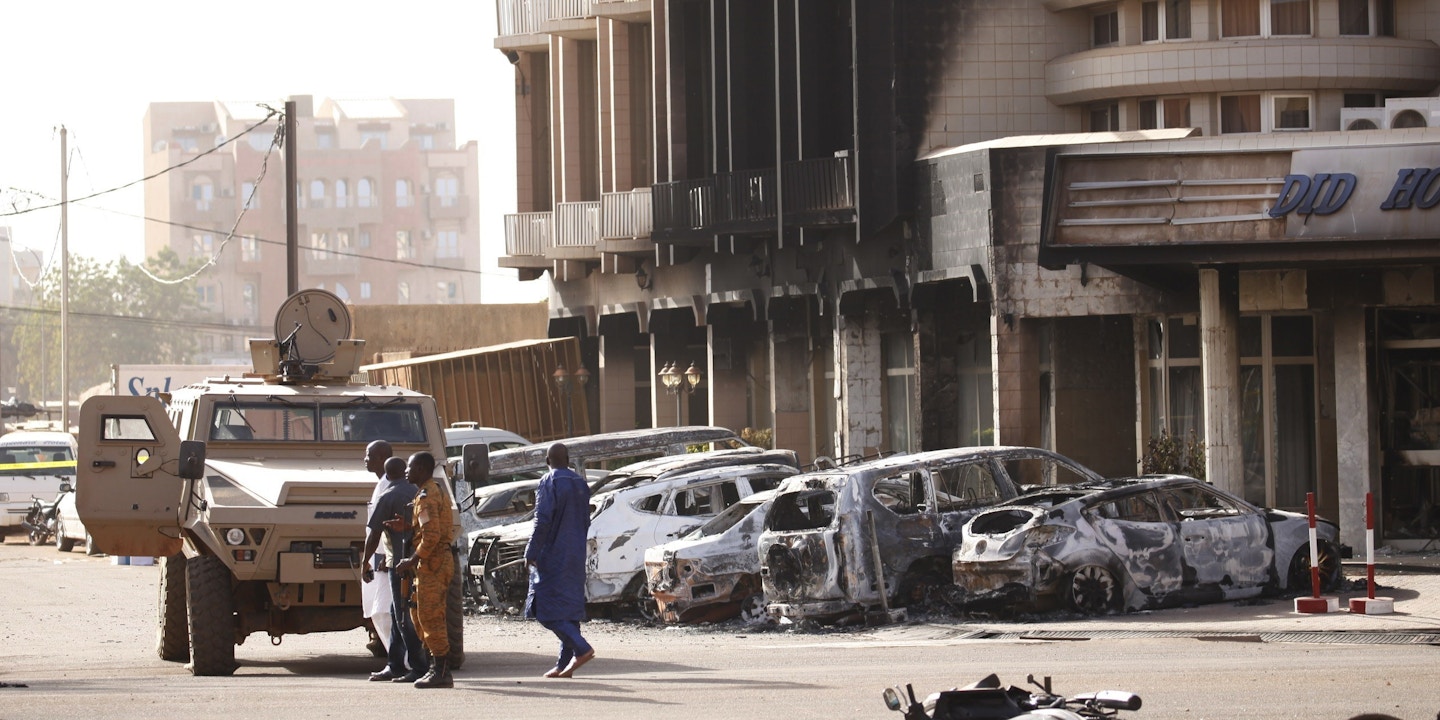

November
22 2018, 1:00 p.m.
ON
A MUGGY EVENING in mid-August, a convoy
of gold miners and gendarmes in 4x4s and pickup trucks drove on an
unpaved road from a Canadian-owned gold mine in Boungou, eastern
Burkina Faso. Just a few miles after leaving the facility, the convoy
hit a mine. Gunmen jumped out from the thick forest on the side of
the road and opened fire, killing five gendarmes and one miner.
Two
months later, in the northern town of Inata near the Malian border —
another gold-mining site — a column of militants on motorcycles
ambushed police in the early hours of the morning, killing one
gendarme and carrying away police equipment as they fled the scene.
The Burkinabé military authorities called in the help of French
troops stationed in neighboring Niger, and they sent two Mirage
fighter jets that
struck the fleeing militants.
This opened up yet another front for France’s overstretched
military operation in the Sahel region, cementing the perception that
six years after the French intervention in Mali, security in the
region is deteriorating.
Since
January 2016, more than 200 militant attacks have killed at least 263
people in Burkina Faso, according to data from Héni Nsaibia, a
researcher at the Armed Conflict Location & Event Data Project (ACLED).
The violence “has created a kind of psychosis in terms of security,
especially in the north,” said Bénéwendé Sankara, vice president
of parliament. “So far, the consequences are terrible. Schools and
health clinics are closed, people have fled. It’s become a no-man’s
land.” The incidents in Boungou and Inata are emblematic — both
in the nature of the attacks and the unknown identity of the
attackers — of the destabilization of the Burkinabé state.
These
attacks are enveloped in a huge mystery — just who is committing
them, and why?
A
few of the major attacks have been claimed by regional jihadi groups
like Al Qaeda in the Islamic Maghreb, Islamic State in the Greater
Sahara, and Al Mourabitoun. Ansar Al Islam, a group founded by
the late Burkinabé radical preacher Malam Ibrahim Dicko, has claimed
others. But more than 90 percent of the attacks have not been claimed
— including the assaults on Boungou and Inata — and the
assailants are unknown, at least to the public. “Behind terrorist
attacks, there is always a political and religious motivation,”
Police Commissioner Anihifahata Yacoub Sié Rachid Palenfo told me
when I recently visited the country.
“In the case of Burkina Faso, we did not feel a religious
motivation. What, then, is the message?”

Gen.
Gilbert Diendéré, left, speaks to media in Ouagadougou, Burkina
Faso, on Sept. 19, 2015.
Photo:
Theo Renaut/AP
WHAT’S
HAPPENING IN Burkina Faso appears to be, at
least in part, an example of blowback against U.S. anti-terror
tactics. That’s because a now-disbanded elite military unit that
received training from the U.S. is suspected of being involved in the
attacks against the country.
There
are multiple theories behind the swift breakdown in security — and
all turn around the 2014 revolution that overthrew ex-dictator Blaise
Compaoré and threatened his feared presidential guard, known by its
French acronym RSP and led by Gen. Gilbert Diendéré. By toppling
only the president, which led to the disbanding of his key military
unit a year later, the revolution left the country with a gaping
security hole. As a special unit of roughly 1,300 soldiers with
separate living quarters, equipment, training, and pay from the
regular army, the presidential guard protected the interests of the
party in power, rather than the country at large. The RSP was
particularly potent, too — it had its own counterterrorism unit
that received training from both France and the U.S.
The
insecurity that Burkina Faso is experiencing today appears to be
proof that support for an elite unit that works for a corrupt
dictator can lead to more terrorism and insecurity. This type of
mistake is one of the hallmarks of the so-called war on terror and
has been repeated, in various forms, in Iraq, Afghanistan, Somalia,
Yemen, and numerous other countries. In Cameroon, for example, the
Rapid Intervention Brigade, an elite unit that the U.S. has worked
with to fight Boko Haram in the north of the country, has been
accused of numerous human rights violations while fighting
Anglophone separatist groups in western Cameroon.
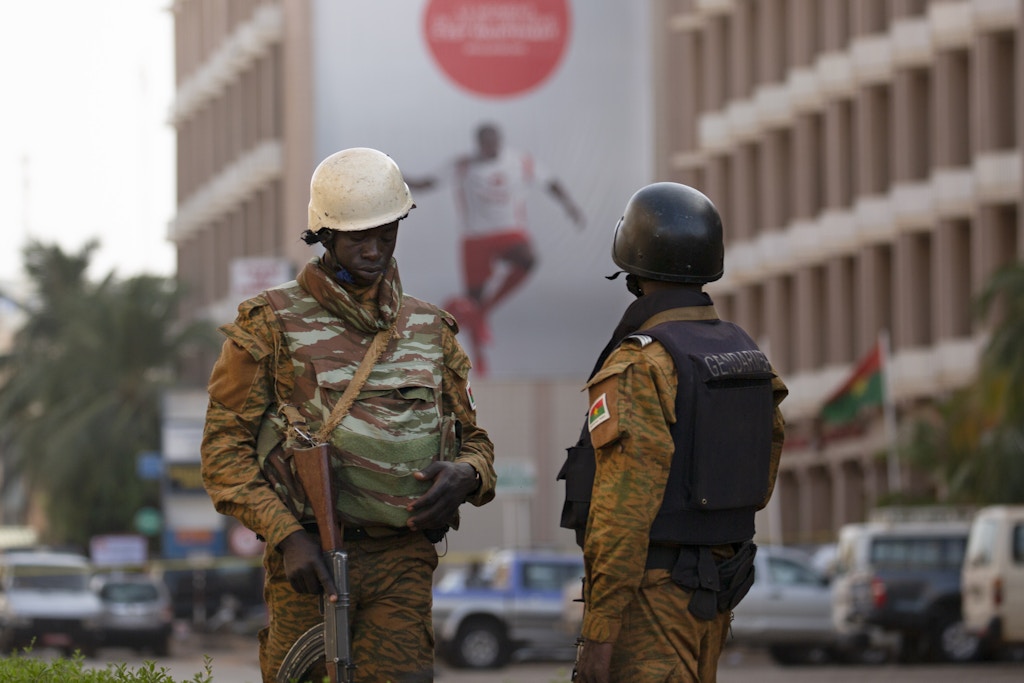
Security
forces stand guard on Jan. 16, 2016, after an Al Qaeda attack killed
30 people in a restaurant and hotel in Ouagadougou, Burkina Faso.
Photo:
Joe Penney for The Intercept
Although
the first truly democratically elected government in Burkina Faso’s
history took the reins in January 2016, “the existence of the state
is still uncertain,” said Méleguem Traoré, a former head of
parliament and close confidant of Compaoré, the former president. In
March, a
double attack hit
the army headquarters and French embassy in the heart of the capital,
Ouagadougou, killing 16. After gunmen from Al Qaeda in the Islamic
Maghreb targeted two restaurants on one of the capital’s busiest
streets, businesses have set up airport-style security at
establishments throughout the city. In Ouagadougou’s main square,
Place de la Nation — where protesters massed to demand the fall of
Compaoré in 2014 and again when Diendéré’s men carried out their
own coup attempt in 2015 to return to power — jumpy soldiers now
monitor all passersby.
Strangely,
the key to ending the mysterious terror attacks may not lie in remote
battlefields, but in a public spectacle that takes place every
weekday in the north of Ouagadougou.

A
garbage collector rides his donkey-led carriage on a street closed
for the trial against former Gen. Gilbert Diendéré and the coup
plotters of 2015 in the Ouaga 2000 neighborhood of Ouagadougou,
Burkina Faso, on Aug. 28, 2018.
Photo:
Joe Penney for The Intercept
IT
HAPPENS AT 10 a.m. in the upscale Ouaga
2000 neighborhood — traffic is shut down on a main throughway
housing embassies and a major hotel. It is in this neighborhood, at a
convention center, that Diendéré, the former head of the
presidential guard, and former Foreign Minister Djibril Bassolé, as
well as 82 others, are standing trial for their roles in a 2015 coup
d’état that sought to overthrow the fledgling transitional
government in favor of Compaoré’s allies. Former RSP soldiers,
some wearing the uniforms of the regular army and some wearing
civilian clothes, respond one by one to questioning by military
judges and prosecution lawyers. Diendéré — who is locked in a
maximum-security military prison and charged with treason, attacking
state security, and the beating and murder of protesters — is due
to stand for questioning soon.
Few
would have dreamed it was possible for someone so feared and powerful
as Diendéré to face such serious criminal charges, making the trial
an unprecedented push toward justice and accountability. Dozens of
journalists attend the proceedings, passing through the tight
security checkpoints to enter every morning and write full accounts
of the day’s proceedings in almost all of the country’s
newspapers.
Prior
to their political demise, Diendéré, Bassolé, and the Mauritanian
consultant they worked with, Moustapha Limam Chafi, were key U.S.
allies in Francophone West Africa. Burkina Faso, which means
“Land of the Upright People,” had never experienced a terrorist
attack. For instance, in 2012, Compaoré, then president, sent
Diendéré on a mission north of Timbuktu, Mali, to procure the
release of Swiss hostage Beatrice Stockly, who had been kidnapped
just nine days earlier by Al Qaeda in the Islamic Maghreb. Over soft
drinks and grilled lamb with one of the most wanted Al Qaeda leaders,
Diendéré ensured the handover of millions of dollars in return for
the Swiss missionary.
Compaoré
— who had come to power in a coup that killed the revolutionary
leader Thomas Sankara in 1987, instilling stability through
authoritarian rule — had played a key role in negotiating the
release of multiple Western hostages in the region. There was a cost
to this, however. Known as
the pompier-pyromane (“firefighter-pyromaniac”),
his efforts to negotiate peace deals with neighbors (like the talks
between Tuareg rebels and the Malian government in Ouagadougou in
2012) were buffeted by reports that he had played a more nefarious
role in numerous conflicts, including arming rebels in Ivory Coast
and trading weapons for diamonds to former President Charles Taylor
in Liberia.


Top:
Anti-government protesters gather in the Place de la Nation in
Ouagadougou on Oct. 31, 2014. Bottom: Anti-government
protesters take over the parliament building in Ouagadougou on Oct.
30, 2014.Photos: Joe Penney/Reuters
In
2014, a popular uprising of millions of protesters fed up with
the pompier-pyromane took
to the streets and chased him from power. Compaoré fled on a French
helicopter to neighboring Ivory Coast and is still there. One of the
transitional government’s most ambitious acts was to try to
completely dissolve the RSP. But in 2015, before the transitional
government got a chance to carry out its plan, Diendéré and the RSP
staged a coup against the transitional government. Diendéré’s
forces were defeated by the regular army and street protests. The RSP
was completely dissolved immediately after the civilian government
was restored to power.
But
this created a dangerous vacuum.
“The
intelligence system that we had was based on structures at the
gendarmerie and at the presidential security unit,” said Traoré,
the confidant of the ousted president. “Those structures were
brutally broken up, and the man at the center of all that, Gen.
Gilbert Diendéré, was taken out of play,” he added.
Under
Compaoré, Tuareg rebel groups who had allied with Al Qaeda were able
to come in and out of Burkina while the country hosted peace talks
between them and the Malian government, giving way to rumors that
Compaoré had a tacit agreement to allow their presence in exchange
for no attacks. The new government made a conscious decision to cut
off their access to the country. “They could have kept up the
contacts, but I think the political choice was to break with these
groups and to ask those who were in Burkina to leave,” said
Sankara, the parliament vice president. “And I think it’s the
result of this decision that it was necessary to hit Burkina.”

The
vice president of the parliament, Bénéwende Sankara, at his office
at the new parliament building in Ouagadougou, Burkina Faso, on Aug.
28, 2018.
Photo:
Joe Penney for The Intercept
Some
in Burkina believe that the RSP and the former regime are at least
partially the cause of the country’s growing instability. “There
is a common interest between the terrorist groups that operate in
West Africa and the Burkinabé political camp that is no longer in
power,” said Guy Hervé Kam, co-founder of the Balai Citoyen, one
of the main groups that organized protests against Compaoré, and one
of the prosecution’s lawyers in the trial against Diendéré and
his co-conspirators. The police commissioner, Anihifahata Yacoub
Sié Rachid Palenfo, said that while RSP deserters may be
participating in the attacks today, there is no proof of this,
although he noted that a number of RSP dismissed for mutiny in 2011
had been proven to be committing crimes and attacks shortly after
their dismissal.
The
researcher Héni Nsaibia argued that “pointing fingers at Diendéré,
Bassolé, ex-RSP, and former President Blaise Compaoré has been very
convenient for the current regime.” Nsaibia believes a large
portion of the attacks are carried out by Ansar Al Islam
militants but also the Islamic State in the Greater Sahara, both of
whom are not claiming responsibility because “none of the groups
have created any media wings,” as well as “strategic
considerations to survive long-term by avoiding unwanted
attention, including military action and ISR/ESM measures by
international forces, the latter creating difficulties for the
militants in communicating with each other regularly from greater
distances.”
Providing
some support to Nsaibia’s thesis, a spokesperson for the French
military said that in addition to the airstrike on fleeing militants
in Inata, whom the French suspect to be from the Ansar Al Islam,
French soldiers have also supported Burkinabé patrols in the east of
the country to stop “armed groups that carry out predatory attacks
and actions against the security forces.”

Burkina
Faso’s former prime minister, Luc Adolphe Tiao, far right, waits
for the opening of the trial of the former president and members of
his last government on April 27, 2017 in Ouagadougou. Photo:
Ahmed Ouoba/AFP/Getty
Images
A damning
Human Rights Watch report stated
that the Burkinabé military’s heavy-handed response to jihadi
militants often aggravated the problems. According to the report,
“Burkinabé security forces have conducted counterterrorism
operations in 2017 and 2018 that resulted in numerous allegations of
extrajudicial killings, abuse of suspects in custody, and arbitrary
arrests,” and a significant portion of the abuses were against the
Peul ethnic group. The security forces’ wanton violence has led to
more lawlessness and local residents are less likely to cooperate
with them against the jihadi groups, the report noted.
Diendéré’s
lawyer, Mathieu Somé, said that his client is innocent on all
charges he is facing (Diendéré is also on trial for his alleged
role in the murder of Thomas Sankara, as well as for the killing of
protesters in the 2014 revolution), and that the trial is a waste of
time. “When you don’t know how to run a country, you’ll always
blame it on someone else,” he said. “Why continue to divide the
country with a nonsensical affair?”
Kam,
however, told me that the prosecution has audio recordings of RSP and
former regime members plotting in French and Arabic with Malian
militants to attack the country. The attacks echo an audio
recordingreleased
in 2015 purporting to show the president of neighboring Ivory Coast’s
parliament, Guillaume Soro, floating a strategy to destabilize the
Burkinabé armed forces in the wake of Diendéré’s failed coup of
2015. “You hit a city in the north; we take a police station or a
gendarmerie. They’re going to flee, they can’t resist,” Soro
says in a phone conversation with Djibril Bassolé, who replies “Yes,
OK.” Soro is a former rebel who
received arms from Compaoré and Diendéré when
his New Forces soldiers were fighting then-Ivorian President Laurent
Gbagbo, and is close to the former Burkinabé regime.
These
are uneasy times in Burkina. Kam is worried for his own security and
thinks that there will be more serious attacks to threaten the
stability of the country as the trial draws closer to its end. There
have already been three prison breaks to free Diendéré that he
knows of. “The atmosphere of fear is not that they will come back
to power, it’s that they are like wounded beasts capable of lashing
out if they have the opportunity,” Kam said. “Take an officer in
the box of the accused who has been in power his whole life. He knows
that if the trial ends, he will do 20 years in prison and will lose
everything. What does he lose by trying to cause trouble?”

A
vendor sells fruits and vegetables at dusk in the Ouaga 2000
neighborhood where former Gen. Gilbert Diendéré and the coup
plotters of 2015 are on trial in Ouagadougon Aug. 28, 2018. Photo:
Joe Penney for The Intercept
THE
HOPE FOR a new kind of democracy that swept
the nation after the dictator fell has given way to fear and
apprehension. With Burkina Faso’s security falling apart, the U.S.
response seems to be more of the same. The U.S. military is once
again working with counterterrorism units in the country. “We are
helping Burkina Faso build counterterrorism units to counter violent
extremist organizations (VEOs) based out of Mali, and we assist
terrorism response forces in Ouagadougou,” said U.S. Africa Command
spokesperson Becky Farmer.
The
Burkina government vows to continue with the trial against Diendéré
and its regular army missions against the militants. Parliament
recently passed laws raising its meager security budget, but it’s
not clear if that will be enough. Unlike neighbors Mali and Niger,
there is relatively little foreign military presence in Burkina,
though that may change soon. “It’s a kind of pressure cooker,
it’s bubbling, and we must find the remedy, otherwise all the
ingredients are there for it to explode,” said Sankara, the vice
president of parliament. “We are fighting them. We pay the price,
every day there are deaths, but I believe that we must succeed in
eradicating them.”
Additional
reporting by Nadoun Coulibaly and Claude Romba.
We
depend on the support of readers like you to help keep our nonprofit
newsroom strong and independent. Join Us
RELATED
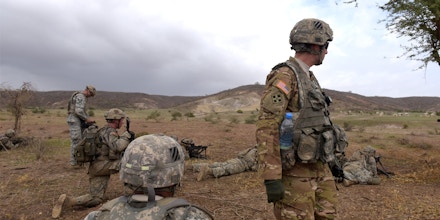
U.S. SPECIAL OPERATIONS NUMBERS SURGE IN AFRICA’S SHADOW WARS
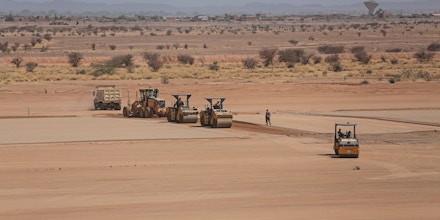
THE U.S. IS BUILDING A DRONE BASE IN NIGER THAT WILL COST MORE THAN $280
===========================================* Niet te verwarren met Ansar al-Islam, een Koerdisch-islam groep, overigens fanatieke aanhangers van de sharia.
** Ouagadougou >> ook Ouaga genoemd.
*** Zie:
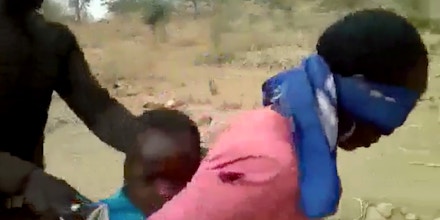

Geen opmerkingen:
Een reactie posten